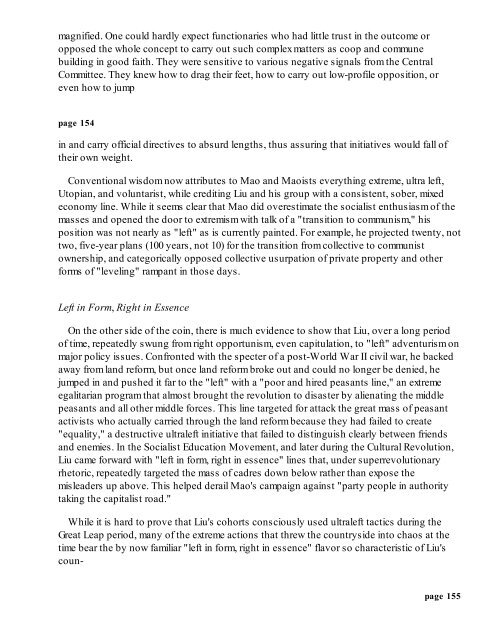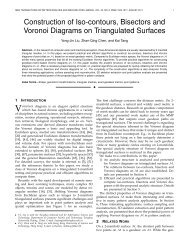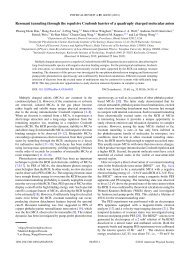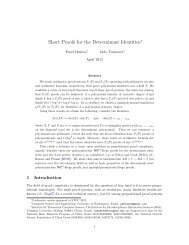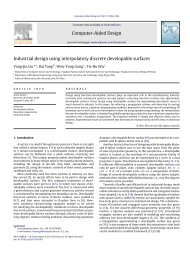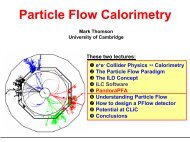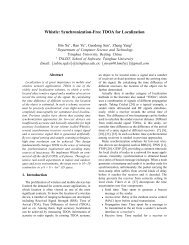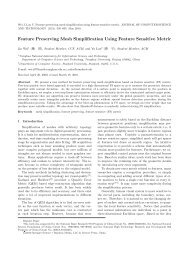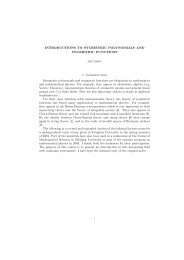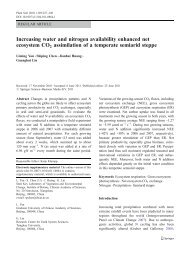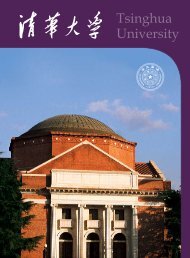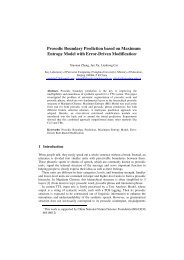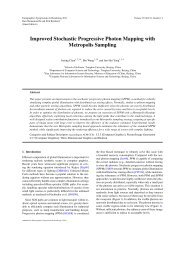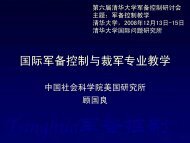All this alarmed certain forces in the party, forces that had opposed agricultural producerscooperatives as "erroneous, dangerous and Utopian." <strong>The</strong>se leaders had even less use forcommunes. Maurice Meisner writes:<strong>The</strong> political functions which Maoists assigned to the communes in theory, and the realities <strong>of</strong>communization, posed a grave challenge to the existing party and state bureaucracies. Had the people'scommunes actually developed in the manner Maoists originally envisaged, centralized political power in<strong>China</strong> would have been fundamentally undermined -- much in the way in which Marx had attributed to theParis Commune the potential to restore to the producers those social powers which had been usurped by thestate. <strong>The</strong> antibureaucratic implications <strong>of</strong> communization were unmistakable, and bureaucrats with vestedinterests in the pre-Great Leap order soon began to respond to the threat.[5]5. Maurice Meisner, Mao's <strong>China</strong> (New York: <strong>The</strong> Free Press, 1977), p. 241.page 153This passage points up a matter that tends to be slighted by conventional academic wisdomand by current Chinese accounts -- that is, the political context <strong>of</strong> the times, the fundamentalsplit within the Communist Party and in Chinese society generally over the direction <strong>of</strong> therevolution after the Communists won power.After 1949 two headquarters, long latent in the party, crystallized out. One, headed by Mao,advocated building socialism as soon as land reform was completed. <strong>The</strong> other, headed byLiu Shaoch'i and Deng Xiaoping, favored an indefinite extension for and consolidation <strong>of</strong> themixed economy <strong>of</strong> New Democracy (now called the primary stage <strong>of</strong> socialism by reformers).Each side had adherents at the very top and roots in the middle and lower levels <strong>of</strong> the partyas well as in society. Since Liu's group controlled the Party Organization Department,responsible for recruiting, discipline, education, and party building in general, it could beargued that they had more clout in the day-to-day formulation and administration <strong>of</strong> policy.Nevertheless, on the question <strong>of</strong> agricultural cooperation Mao carried the day. Whattranspired in real life, however, was not the straightforward mobilization <strong>of</strong> the peasantry tobuild cooperatives, but a severe and protracted tug-<strong>of</strong>-war, a succession <strong>of</strong> actions andreactions, initiatives and counterinitiatives, generated by the opposing sides. <strong>The</strong> strugglestarted with the first faltering steps toward mutual aid and ran right through to the emergence<strong>of</strong> communes and beyond. It continues to this day, even though the vast majority <strong>of</strong> ruralcollectives have long since disbanded.<strong>The</strong> predominance <strong>of</strong> Mao was never more than marginal. It depended in great measure onhis ability to elicit support from below. He <strong>of</strong>ten bypassed the opposition by speakingdirectly to activists and ordinary people at the grass roots. He thus presented Liu and Dengwith a series <strong>of</strong> faits accomplis, which they in turn responded to with faits accomplis <strong>of</strong> theirown, the latter carried out by the wide network <strong>of</strong> functionaries under their organizationalcontrol.Under these circumstances policies tended to suffer severe warp, sometimes to the point <strong>of</strong>a caricature or even mirror image <strong>of</strong> the original, their effectiveness gutted, their shortcomings
magnified. One could hardly expect functionaries who had little trust in the outcome oropposed the whole concept to carry out such complex matters as coop and communebuilding in good faith. <strong>The</strong>y were sensitive to various negative signals from the CentralCommittee. <strong>The</strong>y knew how to drag their feet, how to carry out low-pr<strong>of</strong>ile opposition, oreven how to jumppage 154in and carry <strong>of</strong>ficial directives to absurd lengths, thus assuring that initiatives would fall <strong>of</strong>their own weight.Conventional wisdom now attributes to Mao and Maoists everything extreme, ultra left,Utopian, and voluntarist, while crediting Liu and his group with a consistent, sober, mixedeconomy line. While it seems clear that Mao did overestimate the socialist enthusiasm <strong>of</strong> themasses and opened the door to extremism with talk <strong>of</strong> a "transition to communism," hisposition was not nearly as "left" as is currently painted. For example, he projected twenty, nottwo, five-year plans (100 years, not 10) for the transition from collective to communistownership, and categorically opposed collective usurpation <strong>of</strong> private property and otherforms <strong>of</strong> "leveling" rampant in those days.Left in Form, Right in EssenceOn the other side <strong>of</strong> the coin, there is much evidence to show that Liu, over a long period<strong>of</strong> time, repeatedly swung from right opportunism, even capitulation, to "left" adventurism onmajor policy issues. Confronted with the specter <strong>of</strong> a post-World War II civil war, he backedaway from land reform, but once land reform broke out and could no longer be denied, hejumped in and pushed it far to the "left" with a "poor and hired peasants line," an extremeegalitarian program that almost brought the revolution to disaster by alienating the middlepeasants and all other middle forces. This line targeted for attack the great mass <strong>of</strong> peasantactivists who actually carried through the land reform because they had failed to create"equality," a destructive ultraleft initiative that failed to distinguish clearly between friendsand enemies. In the Socialist Education Movement, and later during the Cultural Revolution,Liu came forward with "left in form, right in essence" lines that, under superrevolutionaryrhetoric, repeatedly targeted the mass <strong>of</strong> cadres down below rather than expose themisleaders up above. This helped derail Mao's campaign against "party people in authoritytaking the capitalist road."While it is hard to prove that Liu's cohorts consciously used ultraleft tactics during theGreat Leap period, many <strong>of</strong> the extreme actions that threw the countryside into chaos at thetime bear the by now familiar "left in form, right in essence" flavor so characteristic <strong>of</strong> Liu'scounpage155
- Page 1 and 2:
THE GREATREVERSALThe Privatization
- Page 3 and 4:
This essence was known to many in C
- Page 5 and 6:
Introduction:China'sRuralReformsThe
- Page 7 and 8:
concern was, of course, the country
- Page 9 and 10:
I looked down in growing disbelief
- Page 11 and 12:
edefining what the word meant. Cert
- Page 13 and 14:
themselves, communists had, perforc
- Page 16 and 17:
It is against the background of Chi
- Page 18 and 19:
eformers. Throughout the whole cour
- Page 20 and 21:
in China. It emphasizes above all t
- Page 22 and 23:
Is Red," that solemn hymn to Mao Ze
- Page 24 and 25:
Hard work to transform the land was
- Page 26 and 27:
If meeting nonrelated young people
- Page 28 and 29:
and three times elevated to top pos
- Page 30:
can supply the raw material for lin
- Page 34 and 35:
Construction Bureau who wanted to n
- Page 36 and 37:
had already found wives and several
- Page 38 and 39:
the peasants first gave support to
- Page 40 and 41:
Zhanglaozhuang brigade, Ershihying
- Page 42 and 43:
see Gaojen commune. There 7,300 abl
- Page 44 and 45:
in 1978), (3) they planted large ar
- Page 46 and 47:
can do so will others not denounce
- Page 48 and 49:
destroyed all economies of scale an
- Page 50 and 51:
The rejection of the above proposit
- Page 52 and 53:
and was raising two pigs that she e
- Page 54 and 55:
page 71in some of the new industrie
- Page 56 and 57:
page 74Reformin Stride:Rural Change
- Page 58 and 59:
authorities is that it automaticall
- Page 60 and 61:
most promising things in the collec
- Page 62 and 63:
than it contributes itself, it is a
- Page 64 and 65:
mechanization plan could have done
- Page 66 and 67:
page 86units, taking a mature sheep
- Page 68 and 69:
measures are necessary.Since these
- Page 70 and 71: tremely hard to carry out. Most mea
- Page 72 and 73: 60,000 mou. This would make seasona
- Page 74 and 75: lock the gates at Qinghua and other
- Page 76 and 77: programs that discourage production
- Page 78 and 79: 19781979198019811982198319841985467
- Page 80 and 81: Peasants who opt for transport on t
- Page 82 and 83: policy. Yet they are much touted by
- Page 84 and 85: millions of mu of badly eroded slop
- Page 86 and 87: page 111culture must also be modern
- Page 88 and 89: The Problem of UnemploymentThe most
- Page 90 and 91: mechanization of the more advanced
- Page 92 and 93: tractor and/or implement tire that
- Page 94 and 95: difficult form of cooperation. Betw
- Page 96 and 97: In order to mechanize agriculture s
- Page 98 and 99: Today's reports credit reform at Da
- Page 100 and 101: were deducted from net income befor
- Page 102 and 103: trees that appear to be, if not aba
- Page 104 and 105: denounced by the central government
- Page 106 and 107: spirit of Dazhai's citizens and to
- Page 108 and 109: Ironic Lessons, Past and PresentIn
- Page 110 and 111: Mao'sRuralPoliciesRevisitedA questi
- Page 112 and 113: point frequently raised by the refo
- Page 114 and 115: page 145Furthermore, the state help
- Page 116 and 117: mechanisms rather than government d
- Page 118 and 119: tractors who leased collective ente
- Page 122 and 123: terthrusts over the years. All of t
- Page 124 and 125: exercises." Just as happened during
- Page 126 and 127: every region.In the fourth place, b
- Page 128 and 129: preserve a strong collective core.
- Page 130 and 131: Finally, China's independent nation
- Page 132 and 133: The World Bank strategy of opening
- Page 134 and 135: people. They want to transform the
- Page 136 and 137: The reformers hoped and planned tha
- Page 138 and 139: TiananmenMassacre:June 1989It's imp
- Page 140 and 141: left, and then there would be a new
- Page 142 and 143: the beginning of it. Once the army
- Page 144 and 145: and I asked him why on earth he wen
- Page 146 and 147: have been doing this work for many
- Page 148 and 149: going to sweep everybody out, so th
- Page 150 and 151: affront, as turmoil, as chaos, and


